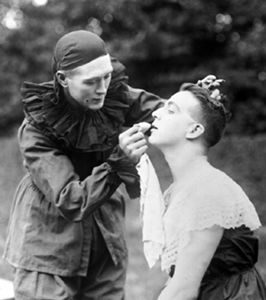Fronted by lead singer Paul Hyde’s eccentric, English-accented vocals and lyrics, and characterized by several shifts in style and sound, the punk/new wave/pop band Payola$ (later Paul Hyde and the Payolas, then Rock and Hyde) was one of the more idiosyncratic Canadian groups to enjoy commercial success in the 1980s. Active from 1979 to 1988, the band had two platinum records in Canada and won three Juno Awards, but is perhaps best known for the reggae-flavoured hit single “Eyes of a Stranger” and for launching the career of legendary record producer Bob Rock.
Early Years and Name
Bob Rock (guitar, vocals) and Yorkshire, England native Paul Hyde (vocals, guitar, lyrics) were high school friends from the Victoria, BC suburb of Langford. After a failed attempt to break into the music scene in London, England, the two settled in Vancouver and in 1979 formed the Payola$ with Ian Tiles (drums) and Marty Higgs (bass). Other members varied during the band's history, but included the bassists Lawrence Wilkins and Alex (“A-Train”) Boynton, and the drummers Taylor Nelson Little and Chris Taylor. The band's name is a reference to the 1960s radio industry scandal in the US, in which record company promoters bribed radio DJs to play certain songs in heavy rotation.
A&M Albums
Beginning in the punk/new wave style, the Payola$ were signed to A&M Records on the strength of their independent single “China Boys” and released the four-song EP Introducing Payola$ in 1980. The band’s critically well-received but commercially unsuccessful debut album, In a Place Like This (1981), was produced by Rock, who was becoming a highly-regarded recording engineer at Vancouver’s Little Mountain Sound Studios.
The group’s follow-up record, No Stranger to Danger (1982), was produced by David Bowie guitarist Mick Ronson and yielded the Top 40 Canadian single “Soldier” and the slightly sinister “Eyes of a Stranger,” which peaked at No. 4 in Canada and earned a Juno in 1983 for Single of the Year. Hyde and Rock also won for Composer of the Year, while the band was named Most Promising Group. “Eyes of a Stranger” was featured in the Nicholas Cage movie Valley Girl (1983) and No Stranger to Danger was certified platinum in Canada for sales over 100,000 copies.
The band’s third album, Hammer On a Drum (1983), went platinum in Canada on the strength of the Top 10 single “Never Said I Loved You,” which featured Rough Trade’s Carol Pope. However, the group’s failure to break through in the US prompted A&M to hire producer David Foster to lend the next album more commercial appeal. The band’s name was also changed to Paul Hyde and the Payolas to downplay the reference to the US radio scandal and thus improve strained relations with industry insiders (Rock has said that A&M promotions executive Charlie Minor once told him, “I’m never going to do a f—ing thing for you. Your name is an insult to what I do for a living”).
The result, the synth-heavy, pop-oriented Here’s the World for Ya (1985), only went gold in Canada and flopped in the US. It did include the minor hit “You're the Only One,” which was also part of the greatest-hits compilation Between a Rock and a Hyde Place: The Best of Payola$ (1987). Following the limited success of the album, A&M Records dropped the group. During the recording, Hyde and Rock earned co-songwriting credit on the Northern Lights charity single “Tears Are Not Enough” by contributing the song title. Hyde also sang on the track, while Rock acted as recording engineer.
Rock and Hyde
Rock and Hyde continued 1986–88 under the name Rock and Hyde; their 1987 release, Under the Volcano, was produced by Rock’s mentor, Bruce Fairbairn, and included the Top 20 Canadian hit “Dirty Water,” which charted well in the US, and the Top 40 Canadian hit “I Will.” The album also earned the band Juno nominations for group, composer and Canadian entertainer of the year.
Without formally disbanding the Payola$, Hyde subsequently pursued a solo career. His album Turtle Island (1989), produced by Rock, included the modest Canadian hit “America is Sexy.” Rock embarked on a hugely successful career as a producer, working with such acts as The Cult, Mötley Crüe, Metallica, The Tragically Hip and Michael Bublé. In 1991, Rock and Chris Taylor formed the short-lived band Rockhead. He also produced and co-wrote some of the songs for Hyde’s album Living off the Radar (2000), which featured Taylor and Boynton.
In 2002, Universal released the compilation album 20th Century Masters: The Best of the Payola$. Rock and Hyde revived the Payola$ between 2003 and 2008, writing new material, performing occasionally and releasing the EP Langford (Part One) in 2007.
Awards
Single of the Year (“Eyes of a Stranger”), Juno Awards (1983)
Most Promising Group of the Year, Juno Awards (1983)
Composer of the Year (“Eyes of a Stranger”), Juno Awards (1983)

 Share on Facebook
Share on Facebook Share on X
Share on X Share by Email
Share by Email Share on Google Classroom
Share on Google Classroom


